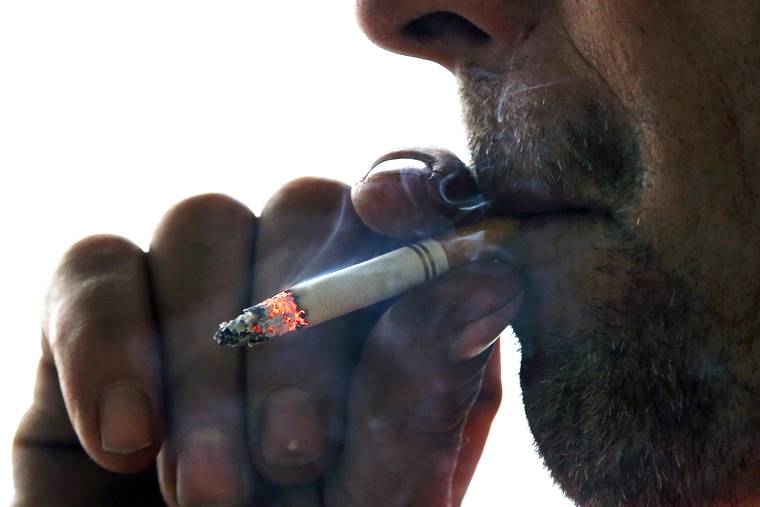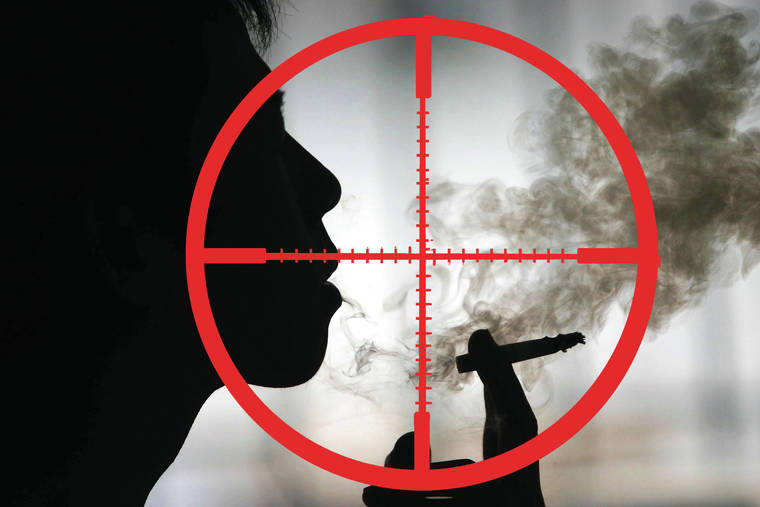Hawaii could mark another first in the nation by increasing the minimum age to 25 to purchase tobacco and electronic smoking devices.
Nearly four years after the Aloha State banned the sale of such items to those under 21, expanding statewide a law passed in 2014 by the Hawaii County Council that did just that on the Big Island, Rep. Richard Creagan (D-Kona, Ka‘u) is looking to up the age again.
House Bill 2507, co-introduced by Creagan and Rep. John Mizuno, an Oahu Democrat and chairman of the House Committee on Health, would make it illegal to purchase the products by anyone younger than 25.
The proposal cites the harmful effect of nicotine on developing brains, particularly youth and young adults and unborn children, as well as a study by the Institute of Medicine that found raising the minimum purchase age led to decreases in smoking prevalence and mortality.
“The Institute of Medicine noted that increasing the age of purchase of cigarettes to 21 years would reduce the adult smoking prevalence by 12%, and an increase to 25 years, as HB 2507 proposes, would decrease prevalence by 16%, as well as reduce tobacco use by those age 13 to 17 years,” Creagan told the House Committee on Health on Tuesday.
Creagan said the brains of young people, particularly men, continue to develop until at least age 25 and are negatively affected by nicotine, which he called a “potent neurotoxin.” Further, many women have children before age 25, and nicotine is capable of causing similar brain damage to babies as the pesticide chlorpyrifos, which is banned in Hawaii.
“If a mother smokes a pack of cigarettes, it has the effect of spraying her unborn baby’s brain with a pesticide 20 times a day. The damage includes lowered IQ, other neurodevelopmental syndromes such as autism and ADHD or it can even cause death,” he said. “All babies of mothers who smoke sustain brain damage from nicotine.”
He added that at least 25% of SIDS deaths (sudden unexplained death in the first year of life) are caused by a mother smoking during pregnancy.
“Back when I was practicing emergency medicine, some of our darkest days started with sobbing mothers rushing in with their babies found dead in their cribs that morning desperately hoping for a miracle that never came,” he said. “We now know that smoking caused a quarter of those deaths — deaths that we hope to start preventing with HB 2507.”
Studies on the effect of e-cigarettes are ongoing, but he said its clear that nicotine levels delivered are higher than combustible cigarettes.
“Eventually, we should consider protecting pregnant women throughout the childbearing age, and going forward we hope the FDA can mandate appropriate warning labels for pregnant women on electronic cigarettes, not just combustible cigarettes,” he said. “Our babies are our future and their brains are even more vulnerable and in need of protection than the brains of our teenagers and young adults.”
Just two others testified during the hearing, Department of Health Director Bruce Anderson and American Cancer Society Regional Director Don Weisman. Both were in support of the intent of the bill, but took issue with proposed fines starting at $500 for the first offense.
Input on the measure didn’t stop there with written testimony submitted by nearly two dozen individuals, groups and organizations. Opposition and support was about evenly split among the testifiers.
“If you are going to raise the age, then make it equal to the voting age just to be fair,” Michael Zehner with the Hawaii Smokers Alliance wrote in submitted testimony.
Testimony from Retail Merchants of Hawaii President Tina Yamaki asked legislators to hold the measure.
“Bans are not the simple solution and will not stop adults from smoking – noting that it is already illegal for minors. This type of ban would only push the sale of cigarettes and vaping devices into the black market and to online sales,” Yamaki wrote. “Persons 21 years of age are deemed to be adults and should be allowed to make their own decisions when it comes to smoking or vaping.”
The measure was unanimously passed by the committee with amendments during Tuesday’s hearing. The amendments were technical in nature or for clarification, other than delaying the effective date to 2050 to further discussion.
HB 2507 next needs passage by the House committees on Judiciary and Finance before it can go back to the floor for a full House vote to move over to the Senate for consideration.
Since Hawaii upped its minimum purchase age from 18 to 21 in 2016, other locales and states have increased their minimum ages as well. Prior to President Donald Trump on Dec. 20, 2019, signing the Federal Food, Drug, and Cosmetic Act making it illegal across the United States for a retailer to sell any tobacco product – including cigarettes, cigars and e-cigarettes — to anyone under 21, 16 states and the District of Columbia had “tobacco 21” laws.
“The impetus for that legislation was the deleterious effect of nicotine on the developing teenage and young adult brain,” Creagan said adding it was in part due to the “epidemic of vaping use by teenagers.”
Rep. Gene Ward, an Oahu Republican, prior to voting on Creagan’s bill asked the Democrat his raison d’etre.
“Are you in the process of heralding in the post-tobacco era in Hawaii, if not America?” he asked. “Are we in the post-tobacco era already?”
Creagan said Hawaii is on the forefront of doing just that, noting that in the early 1900s, 15 states outright banned cigarettes for up to 20 years.
“We did 21 first. I think we can do 25 first. And I think we could get to be a tobacco-free state, a cigarette-free and vaping-free state in the near future. We just have to have the will, and the will is here. If we had enough legislators to pass the bill, we would not have cigarettes in our state,” he said. “I anticipate we will be the first state to be cigarette-free.”
Around Kona, the feeling about increasing the age to purchase tobacco and electronic smoking devices in Hawaii differed depending on the person, but all agreed it could help stop a bad habit from taking hold.
“If you can serve your country at 18, you should be able to buy alcohol and cigarettes,” said James Kanuha. “But it is a good idea, because it’s good for the younger generation.”
Another said the age to purchase alcohol should be increased.
“Alcohol is 21. Alcohol should be 25, not cigarettes,” said Tyson Domingo. “Alcohol does a lot more damage than tobacco.”
In addition to House Bill 2507, there are several other bills moving in the Legislature related to tobacco and electronic smoking device use and sales.
House Bill 2540, also introduced by Creagan, would have banned cigarette sales by increasing the minimum age to purchase them to age 100 by 2025, passed the House Committee on Health after being gutted and its contents replaced. The measure, as passed, would now increase taxes on tobacco and tobacco-related products by an unspecified amount.
House Bill 2347, which bans the sale of flavored tobacco products in Hawaii, also passed the above committee with amendments removing menthol and tobacco flavors from the ban. A companion bill in the Senate, SB 2903, has yet to be assigned a committee hearing.
House Bill 2456, which would make it unlawful to ship e-liquid and electronic smoking devices containing e-liquid, was passed with amendments by the House Committee on Health on Tuesday. The Senate Committee on Consumer Protection and Health is set to take up the bill’s companion, SB 2231, today.
House Bill 2348, which would create penalties for retailers who sell electronic smoking devices and tobacco to persons under 21, also passed the committee with amendments. A companion bill in the Senate, SB 2904, is awaiting committee hearings.
In late January, the American Lung Association recommended that lawmakers enact public policies to reduce tobacco use and exposure to secondhand smoke by prohibiting the sale of flavored tobacco products; implementing a tax on electric smoking devices in parity with other tobacco product; and maintaining funding for tobacco prevention and cessation programs.
Those suggestions were contained in the organization’s annual State of Tobacco Control report grading Hawaii in five categories on policies to prevent and reduce tobacco and e-cigarette use.
The state received a D for its funding of tobacco prevention programs and Cs for its level of state tobacco taxes and coverage and access to services to quit tobacco. For its age restrictions, Hawaii got a B, and for its smoke-free workplace laws, the state received an A.
Tobacco use remains the leading cause of preventable death and disease in the United States, claiming about 480,000 lives each year, according to the American Lung Association. According to the Centers for Disease Control and Prevention, 1,400 adults in Hawaii die annually from smoking-related illnesses.
West Hawaii Today reporter Laura Ruminski contributed to this report.









